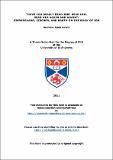Files in this item
"Have you really read Job? Read him, read him again and again" : Kierkegaard, Vischer, and Barth on the book of Job
Item metadata
| dc.contributor.advisor | Elliott, Mark | |
| dc.contributor.author | Lewis, Andrew Zack | |
| dc.coverage.spatial | viii, 254 | en_US |
| dc.date.accessioned | 2012-09-22T20:11:08Z | |
| dc.date.available | 2012-09-22T20:11:08Z | |
| dc.date.issued | 2011 | |
| dc.identifier | uk.bl.ethos.556384 | |
| dc.identifier.uri | https://hdl.handle.net/10023/3141 | |
| dc.description.abstract | This thesis explores the reception history of the book of Job, particularly in Søren Kierkegaard’s Three Upbuilding Discourses and Repetition, Wilhelm Vischer’s “Hiob, ein Zeuge Jesu Christi,” and Karl Barth’s Church Dogmatics. It examines the hermeneutical presuppositions of these three scholars and how the scholars themselves fit into the history of interpretation, showing that they use a post-critical allegorical interpretation in order to explore the freedom of God and humanity. Chapter one offers a defense of using reception history in biblical studies. By walking through Mikhail Bakhtin’s theories on great time and the chronotope, it argues that great texts continue to live and grow even after their completion and canonization. During this “afterlife,” their meaning expands as more readers participate in their interpretations. Chapter two examines the afterlife of the book of Job in the hands of Christian exegetes, focusing on allegory and freedom in the interpretations by Gregory the Great, Thomas Aquinas, Martin Luther, John Calvin, and Immanuel Kant. Chapter three looks at the unusual and rich interpretations of Job by Kierkegaard—the autonymous upbuilding discourse on Job’s response to his suffering in the prologue and the novella Repetition as an interpretation of the dialogue between Job and his friends. Chapter four examines the interpretation of the book of Job in Vischer’s mini-commentary. Vischer sees the character of Job as one whose devotion to God goes beyond the laws that God purveys and the doctrine that seeks to explain God. Referring specifically to the works of Kierkegaard and Vischer, Karl Barth’s work on Job—the focus of chapter five—sees the book of Job as illustrative of Jesus Christ’s relationship to God and humanity. All three scholars incorporated allegory while ruminating on the freedom of God in the book of Job. The final chapter evaluates their interpretations while addressing their similarities and differences. | en_US |
| dc.language.iso | en | en_US |
| dc.publisher | University of St Andrews | |
| dc.subject.lcc | BS1415.52L4 | |
| dc.subject.lcsh | Bible. O.T. Job--Criticism, interpretation, etc. | en_US |
| dc.subject.lcsh | Kierkegaard, Søren, 1813-1855. Tre opbyggelige taler | |
| dc.subject.lcsh | Kierkegaard, Søren, 1813-1855. Gentagelsen | |
| dc.subject.lcsh | Vischer, Wilhelm, 1895- Hiob : ein Zeuge Jesu Christi | |
| dc.subject.lcsh | Barth, Karl, 1886-1968. Kirchliche Dogmatik | |
| dc.title | "Have you really read Job? Read him, read him again and again" : Kierkegaard, Vischer, and Barth on the book of Job | en_US |
| dc.type | Thesis | en_US |
| dc.type.qualificationlevel | Doctoral | en_US |
| dc.type.qualificationname | PhD Doctor of Philosophy | en_US |
| dc.publisher.institution | The University of St Andrews | en_US |
This item appears in the following Collection(s)
Items in the St Andrews Research Repository are protected by copyright, with all rights reserved, unless otherwise indicated.

